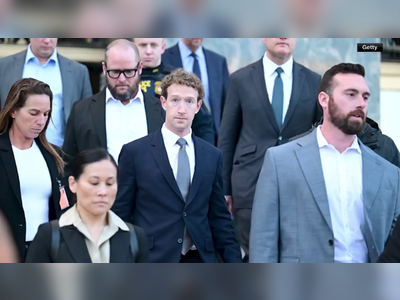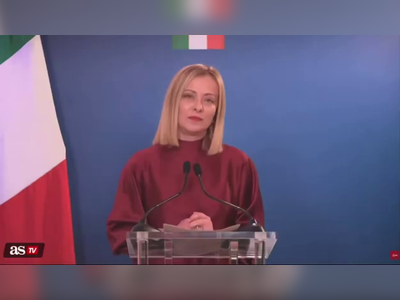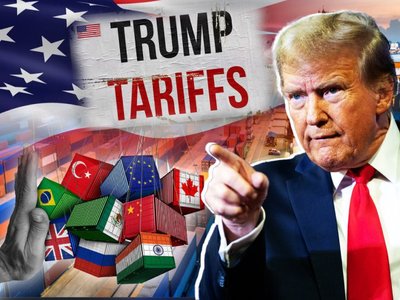EU Orders Apple to Open Up: A Bold Move Against Corporate Monopolies
As the EU takes a stand against Apple's restrictive practices, questions arise over the global response to tech giants' influence on competition and consumers.
In a landmark ruling, the European Union has ordered Apple to open up its ecosystem to rival devices and software, a decision that could reshape the competitive landscape of the tech industry.
After years of investigations into Apple's monopolistic practices, the EU has escalated its efforts to curb the company's dominance by forcing it to loosen its grip on key services like the App Store and iMessage.
This bold move comes at a time when the EU is under pressure to not only protect consumers but also to assert its regulatory influence in the face of an increasingly powerful tech industry.
The decision is seen as a significant victory for EU regulators, who have long been at the forefront of antitrust enforcement, particularly in the tech sector.
Margrethe Vestager, the European Competition Commissioner, has been vocal in her stance against Apple’s business model, which critics argue traps consumers within a closed ecosystem that stifles competition.
By requiring Apple to make its platform more accessible to rivals, the EU is seeking to promote innovation and fair competition, in line with its broader goal of ensuring that digital markets are not dominated by a few tech behemoths.
For years, Apple has defended its practices by claiming that the tight control over its ecosystem is essential for security, privacy, and user experience.
However, critics argue that these claims are often used as smokescreens to prevent competitors from accessing the same marketplace, thus limiting choice for consumers.
Apple’s response to the EU’s order has been predictable, with the company vowing to appeal the decision, citing the potential risks to privacy and security.
The move comes at a time when other tech giants, like Google and Facebook, are facing increasing scrutiny from European regulators.
Facebook, for instance, was recently slapped with an €800 million fine for its antitrust violations.
These actions highlight the EU's growing resolve to tackle the monopolistic practices of American tech companies, often at odds with the US government’s more lenient approach to corporate influence.
While the EU’s decision may be celebrated by consumer advocates and rival companies, it raises important questions about the future of the global tech industry.
The United States, for instance, has historically been reluctant to take such a tough stance against its homegrown tech giants.
With the US government often prioritizing the interests of corporate America, there is a growing divide between Europe’s regulatory approach and the US’s laissez-faire stance on tech regulation.
The ramifications of this ruling are far-reaching, not just for Apple, but for the entire tech ecosystem.
If Apple is forced to open up its platform to rivals, it could set a precedent for how other tech companies operate within the EU.
The decision also signals that the EU is willing to use its regulatory power to challenge the global dominance of US tech giants, a move that could shift the balance of power in the digital economy.
The broader implications for competition and innovation in the tech sector are immense.
By ensuring a level playing field, the EU is attempting to foster a market where new players can enter, existing companies can compete on equal footing, and consumers are offered more choices.
However, this could also spark a wave of retaliatory actions from the US, potentially leading to a trade war between the EU and the US tech industry.
As the EU and Apple head towards what is likely to be a lengthy legal battle, the question remains: will this regulatory confrontation result in a more competitive and consumer-friendly digital marketplace, or will it simply serve to highlight the deepening divide between Europe’s aggressive stance on regulation and the US's preference for corporate self-regulation?
Whatever the outcome, this case will be one to watch closely, as it will likely set the tone for future tech regulation both within the EU and globally.
After years of investigations into Apple's monopolistic practices, the EU has escalated its efforts to curb the company's dominance by forcing it to loosen its grip on key services like the App Store and iMessage.
This bold move comes at a time when the EU is under pressure to not only protect consumers but also to assert its regulatory influence in the face of an increasingly powerful tech industry.
The decision is seen as a significant victory for EU regulators, who have long been at the forefront of antitrust enforcement, particularly in the tech sector.
Margrethe Vestager, the European Competition Commissioner, has been vocal in her stance against Apple’s business model, which critics argue traps consumers within a closed ecosystem that stifles competition.
By requiring Apple to make its platform more accessible to rivals, the EU is seeking to promote innovation and fair competition, in line with its broader goal of ensuring that digital markets are not dominated by a few tech behemoths.
For years, Apple has defended its practices by claiming that the tight control over its ecosystem is essential for security, privacy, and user experience.
However, critics argue that these claims are often used as smokescreens to prevent competitors from accessing the same marketplace, thus limiting choice for consumers.
Apple’s response to the EU’s order has been predictable, with the company vowing to appeal the decision, citing the potential risks to privacy and security.
The move comes at a time when other tech giants, like Google and Facebook, are facing increasing scrutiny from European regulators.
Facebook, for instance, was recently slapped with an €800 million fine for its antitrust violations.
These actions highlight the EU's growing resolve to tackle the monopolistic practices of American tech companies, often at odds with the US government’s more lenient approach to corporate influence.
While the EU’s decision may be celebrated by consumer advocates and rival companies, it raises important questions about the future of the global tech industry.
The United States, for instance, has historically been reluctant to take such a tough stance against its homegrown tech giants.
With the US government often prioritizing the interests of corporate America, there is a growing divide between Europe’s regulatory approach and the US’s laissez-faire stance on tech regulation.
The ramifications of this ruling are far-reaching, not just for Apple, but for the entire tech ecosystem.
If Apple is forced to open up its platform to rivals, it could set a precedent for how other tech companies operate within the EU.
The decision also signals that the EU is willing to use its regulatory power to challenge the global dominance of US tech giants, a move that could shift the balance of power in the digital economy.
The broader implications for competition and innovation in the tech sector are immense.
By ensuring a level playing field, the EU is attempting to foster a market where new players can enter, existing companies can compete on equal footing, and consumers are offered more choices.
However, this could also spark a wave of retaliatory actions from the US, potentially leading to a trade war between the EU and the US tech industry.
As the EU and Apple head towards what is likely to be a lengthy legal battle, the question remains: will this regulatory confrontation result in a more competitive and consumer-friendly digital marketplace, or will it simply serve to highlight the deepening divide between Europe’s aggressive stance on regulation and the US's preference for corporate self-regulation?
Whatever the outcome, this case will be one to watch closely, as it will likely set the tone for future tech regulation both within the EU and globally.











